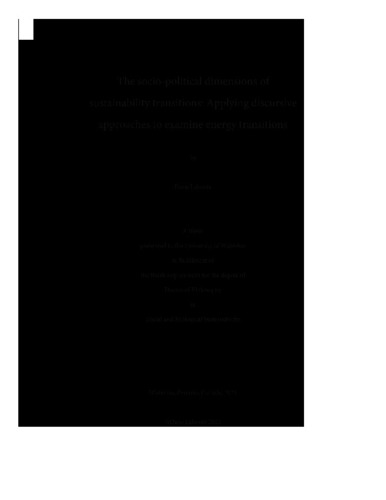| dc.description.abstract | In the IPCC’s (2018) Special Report on 1.5°C, international climate scientists emphasized that increased climate change is expected to impose considerable, wide-ranging impacts on natural and human systems. The Special Report also offers high-level pathways for social and technological change that could be expected to mitigate the risks associated with climate change. Acknowledging that social and technological systems are inextricably linked, the report refers to these pathways as involving socio-technical systems. Sustainability transitions is an emerging field of research that has centred the importance of socio-technical systems (Geels, 2019; Köhler et al., 2019; Markard, Raven, & Truffer, 2012). Sustainability transitions are understood to be inherently political because various actors involved in these processes may contest the overarching goal and/or approach to achieving that goal (Meadowcroft, 2011; Shove & Walker, 2007). While socio-political dimensions are acknowledged to be important for understanding sustainability transitions, emphasizing these dimensions has remained a challenge in the literature (Geels, 2019).
In this dissertation, the contests to reinforce or to reinvent institutional structures that serve to organize actor behaviour are conceptualized as the socio-political dimensions of sustainability transitions. A theoretical framework, the terrain of discursive struggle, is presented with the aim of conceptualizing the range of institutional structures that might be challenged during sustainability transitions and identifying where discursive approaches may be applied to illuminate those institutional struggles. The primary question of the dissertation is: How and to what extent can discursive approaches be applied to understand the socio-political dimensions of sustainability transitions? To that end, three case studies explore the terrain of discursive struggle associated with energy sector transitions by employing varied discursive approaches to analyze data from different discursive forums with distinct contexts.
The first study investigates how monopoly regime actors – namely, local distribution companies’ representatives in Ontario, Canada – understand and communicate potential innovation in their sector. The second study examines the narratives and framing in newspaper coverage of energy storage technologies in California and Hawaii (United States) over nearly a decade (2010 to 2019). The third study explores how Twitter data can inform the study of the socio-political dimensions of sustainability transitions by leveraging tweets that include #ONpoli (a hashtag for discussing the politics of Ontario, Canada) and that reference energy and electricity issues. A cross-analysis of the three studies reveals broader conclusions related to the terrain of discursive struggle.
Given the wide-ranging implications of sustainability transitions, the terrain of discursive struggle associated with sustainability is necessarily vast: there are many potential institutional structures that will be reinforced or reinvented during sustainability transitions. The terrain of discursive struggle helps to conceptualize the range of socio-political contests associated with sustainability transitions, but it does not identify those contests that are most meaningful to examine. While discourses construct institutions and discursive struggles can reshape institutional structures, not all discursive struggle is accessible to a researcher. Therefore, researchers aiming to understand institutional change associated with a sustainability transition must focus their efforts on specific discursive struggles that are accessible and that they believe will illuminate meaningful aspects of institutional change. Across the studies, this dissertation makes empirical, methodological, and theoretical contributions to knowledge. Collectively, the studies offer insights regarding the application of discursive approaches to understanding the socio-political dimensions of sustainability transitions. | en |

